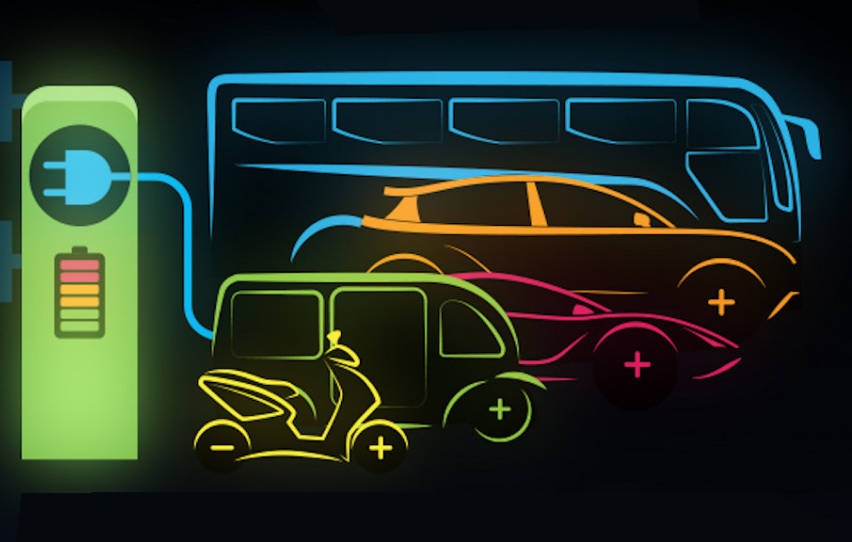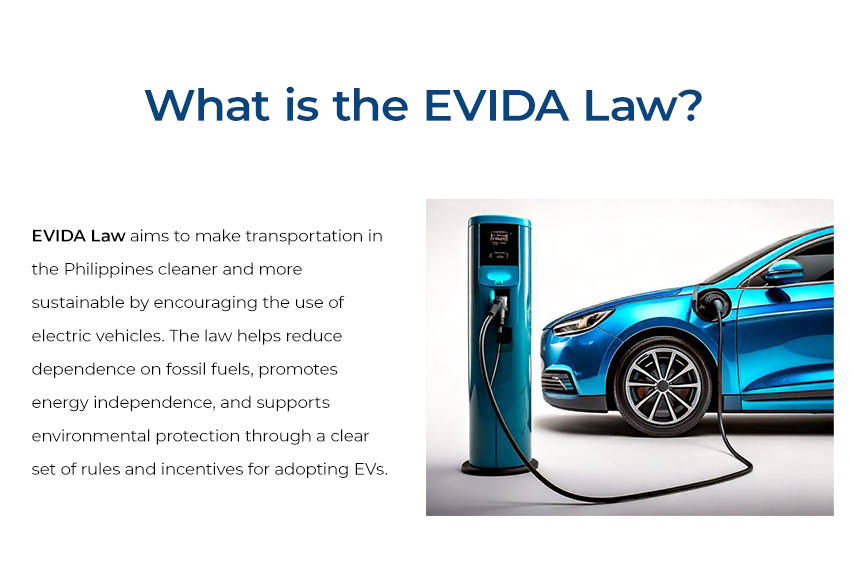How EVIDA is shaping the future of EV registration in the Philippines

Electric vehicles were introduced as an alternative fuel-powered vehicle. They are also a perfect solution to the ever-increasing fuel prices, as they are powered by large batteries that run the motors. To get them in action, one simply needs to connect the EV to an electric source, like charging a smartphone or laptop.
KEY TAKEAWAYS
What is the EVIDA Law?
It promotes the development and use of electric vehicles through incentives, regulatory support, and infrastructure development.Are there tax incentives for EVs in the Philippines?
Yes, EVIDA provides excise tax exemptions for EVs and hybrid vehicles, along with discounts on registration fees.What are the benefits of registering an EV under EVIDA?
EV registration under EVIDA includes priority processing, special plates, and exemption from number-coding schemes.What is the future outlook for EV adoption in the Philippines?
With EVIDA’s incentives, the EV market is expected to expand, supported by government and private sector efforts.However, with the introduction of electric vehicles, there was a need for a law that would act as a regulatory framework and create a comprehensive roadmap for EV operation. In response, the government introduced the Republic Act No. 11697, commonly known as the Electric Vehicle Industry Development Act (EVIDA Law).
Before getting into the details of the EVIDA Law and seeing how it is shaping the future of EV registration in the country, it is important to understand EVs a little better.
What is an EV?
As discussed, EVs are designed to run on electricity rather than gasoline. They feature large batteries that need to be recharged via an electric source.
Advantages and disadvantages of using EVs
Purchasing an EV isn’t all bed of roses, it comes with its own set of challenges, however, given the merits, we think the cons are manageable.
|
Advantages |
Disadvantages |
|
Energy-efficient: EVs feature smart systems and regenerative braking. |
Expensive: EVs in the Philippines carry a hefty price tag. |
|
At-home fuel station: Rechargeable from home, no worry about exorbitant gas prices. |
Rare availability of charging stations: EVs are relatively new, meaning charging stations are scarce. |
|
Easy maintenance: No need for oil changes, or spark plug changes. |
Shorter driving range: Entry-level EVs have shorter ranges. |
|
Environment-friendly: No direct emission, as they are powered by electricity. |
Charging takes time: EVs approximately takes 5 hours to a day to charge fully. |
Electric cars in the Philippines
Electric cars are slowly making their way into the Philippine's auto arena. Though the availability is rare, things are starting to look up for the industry. For one, President Ferdinand Marcos Jr. even approved a temporary traffic reduction on EVs and spare tarts to 0%, all to encourage prospective buyers to consider EVs.
Further, the government also worked out the EV Industry Development Act (EVIDA Law) and the Comprehensive Roadmap for the Electric Vehicle Industry (CREVI), to boost the development of EVs in the Philippines. In this article, we’ll be discussing the two in detail as they both complement each other.
 Photo from mnlop
Photo from mnlopUnderstanding the EVIDA Law
The Electric Vehicle Industry Development Act (EVIDA), or Republic Act No. 11697, became law in April 2022. It aims to make transportation in the Philippines cleaner and more sustainable by encouraging the use of electric vehicles. The law helps reduce dependence on fossil fuels, promotes energy independence, and supports environmental protection through a clear set of rules and incentives for adopting EVs.

Key objectives of EVIDA
EVIDA aims to do the following -
- Promote energy independence: By reducing the country's reliance on imported fuel, EVIDA enhances energy independence.
- Encourages EV development: The law creates a supportive environment for manufacturing, importing, and utilizing electric vehicles.
- Foster innovation: The act promotes sustainable and clean technologies, aligning with global environmental goals.
- Enhances public well-being: By reducing emissions, EVIDA contributes to improved public health.
- Boost local industry: Supporting EV manufacturing generates employment and nurtures globally competitive industries.
Comprehensive Roadmap for Electric Vehicle Industry (CREVI)
The EVIDA is complemented very well by the CREVI as it outlines strategies for EV adaptation and growth. It supports the EV setup through the following means -
- Infrastructure development: CREVI encourages the development of EV charging stations and designated parking slots in the country.
- Manufacturing support: The law establishes standards for EV production, batteries, and recycling facilities.
- Research & innovation: It encourages R&D for advanced EV technologies.
- Human resource development: It encourages training skilled workers to support the EV industry.
Simplified EV Registration
One of the biggest contributions of EVIDA is prioritising and streamlining the EV registration process. How? Well, under its framework -
- EVs are assigned special plates and are exempt from the Unified Vehicular Volume Reduction Program (UVVRP), commonly known as the number-coding scheme.
- Procedures for registering EVs, including e-bikes and e-scooters, have been simplified. Owners must provide essential documents such as vehicle specifications and certificates of roadworthiness to comply with Land Transportation Office (LTO) requirements.
EVIDA Law incentives
The EVIDA law includes several fiscal and non-fiscal incentives. Let us discuss each in detail -
|
Non-Fiscal incentives
|
|
Fiscal incentives
|
Other benefits of EVIDA Law
There seems to be no dearth of EV ownership benefits under the EVIDA Law. The list includes -
- 100% excise tax exemption for fully battery-operated vehicles
- 50% excise tax exemption for hybrid vehicles operated both by fuel and battery
- More job opportunities for local skilled workers
- Less reliance on imported fuel
- Designated charging stations for EVs in gasoline stations and parking facilities in establishments
Bottom line
The EVIDA law represents a significant step towards a sustainable and innovative transportation future in the Philippines. It addresses energy, environmental, and industrial challenges and lays the foundation for widespread EV adoption.
Also Read: Here’s how to easily obtain car insurance quotes online
Featured Articles
- Latest
- Popular
Recommended Articles For You
Featured Cars
- Latest
- Upcoming
- Popular
Car Articles From Zigwheels
- News
- Article Feature
- Advisory Stories
- Road Test
